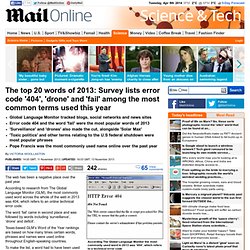

Nominalizations Are Zombie Nouns. Draft is a series about the art and craft of writing.

Take an adjective (implacable) or a verb (calibrate) or even another noun (crony) and add a suffix like ity, tion or ism. You’ve created a new noun: implacability, calibration, cronyism. Sounds impressive, right? Nouns formed from other parts of speech are called nominalizations. Academics love them; so do lawyers, bureaucrats and business writers. What we liked in 2013: words. Oh hi, is that a selfie of you twerking in the middle of a sharknado? Such is the pleasurable speed of linguistic invention that this perfectly normal sentence would have been incomprehensible to most people only a year ago. Beyond selfies and twerking … the words that really mattered in 2013. Big data This was a year in which sheer hugeness was exciting, as vividly demonstrated by Pacific Rim, Guillermo del Toro's excellent film about giant robots punching giant monsters in what passed for their giant faces.

Similar thrills attended the mainstreaming of the phrase "big data", which made everyone wonder in embarrassment how they had got along with their pathetic wad of tiny data for so long. Metadata. How authors from Dickens to Dr Seuss invented the words we use every day. Butterfingers Charles Dickens used the term in his 1836 The Pickwick Papers (more properly called The Posthumous Papers of the Pickwick Club): "At every bad attempt at a catch, and every failure to stop the ball, he launched his personal displeasure at the head of the devoted individual in such denunciations as 'Ah, ah!

—stupid'—'Now, butter-fingers'—'Muff'— 'Humbug'—and so forth. " Chintzy Originally this word meant to be decorated or covered with chintz, a calico print from India, or suggestive of a pattern in chintz. It was extended to mean unfashionable, cheap or stingy, coming from none other than Mary Ann Evans, better known by her pen name George Eliot, who wrote in a letter in 1851: "The effect is chintzy and would be unbecoming.
" Chortle. Why Americans Call Soccer 'Soccer' How different country refer to the game of soccer.

The shades of pink are variations and literal translations of "football," blues are "soccer," and greens are other etymologies. ( reddripper/reddit ) New Zealand's largest newspaper is deeply conflicted. With the World Cup underway in Brazil, should The New Zealand Herald refer to the "global round-ball game" as "soccer" or "football"? The question has been put to readers, and the readers have spoken. It's "football"—by a wide margin.
We in the U.S., of course, would disagree. The story begins, like many good stories do, in a pub. Grammar Exercises - Root Words. Etymology: Languages that have contributed to English vocabulary over time. In Borrowed Words: A History of Loanwords in English, I examine how words borrowed from different languages have influenced English throughout its history.

The above feature summarizes some of the main data from the book, focusing on the 14 sources that have given the most words to English, as reflected by the new and revised entries in the Oxford English Dictionary. Using the date buttons at the top of the graphic, you can compare the impact that different languages have made on English over time. In the "per period" view, you can see the proportions of words coming into English from each source in 50-year slices from 1150 up to the present day. Compare, for instance, how the input from German has grown and then declined again from 1800 to the present day. (The earliest period, pre-1150, is much longer than 50 years, because more precise dating of words from this early stage in the history of English is very problematic.) A version of this post appeared on Oxford Dictionaries.
THE SIMPSONS Will Do a Full LEGO Animated Episode. Beyond selfies and twerking … the words that really mattered in 2013. The Oxford Dictionaries Word of the Year 2013 is… It’s that time of the year again.

With a fanfare and a drum roll, it’s time to announce the Oxford Dictionaries Word of the Year. The votes have been counted and verified and I can exclusively reveal that the winner is…. A picture can paint a thousand words The decision was unanimous this year, with little if any argument. This is a little unusual. When it started. The top 20 words of 2013: Survey lists error code '404', 'drone' and 'fail' among the most common terms used this year. Global Language Monitor tracked blogs, social networks and news sites Error code 404 and the word 'fail' were the most popular words of 2013'Surveillance' and 'drones' also made the cut, alongside 'Solar Max''Toxic politics' and other terms relating to the U.S federal shutdown were most popular phrases Pope Francis was the most commonly used name online over the past year By Victoria Woollaston Published: 14:00 GMT, 11 November 2013 | Updated: 16:03 GMT, 13 November 2013.

A Wordnado of Words in 2013. OED birthday word generator: which words originated in your birth year. Do you know which words entered the English language around the same time you entered the world?

Use our OED birthday word generator to find out! We’ve scoured the Oxford English Dictionary (OED) to find words with a first known usage for each year from 1900 to 2004. Pain in the ananas: etymology maps. 12 Old Words that Survived by Getting Fossilized in Idioms. English has changed a lot in the last several hundred years, and there are many words once used that we would no longer recognize today.

For whatever reason, we started pronouncing them differently, or stopped using them entirely, and they became obsolete. There are some old words, however, that are nearly obsolete, but we still recognize because they were lucky enough to get stuck in set phrases that have lasted across the centuries. Here are 12 lucky words that survived by getting fossilized in idioms. 1. wend. 'In the six' and football's other strange Americanisms. 27 May 2013 Last updated at 08:10 GMT By Tom Geoghegan BBC News, Washington Beckham has departed but Fox's Gus Johnson (bottom right) is a new talking point for US fans British attempts to describe baseball provoke ridicule in the US, while American jargon in "soccer" causes amusement and bafflement among British fans.
Why do people care so much? If England and America truly are two nations divided by a common language then sporting talk is where the chasm is at its widest. 7 Words that Came About from People Getting Them Wrong. 1.

Pea Originally the word was "pease," and it was singular. ("The Scottish or tufted Pease..is a good white Pease fit to be eaten. ") From Riddle to Twittersphere: David Crystal tells the story of English in 100 words. Linguists reveal the 100 words that have shaped the English language. Languages of the World. History of Languages Mythological Roots One of the earliest written accounts of language is in Genesis, dated about one thousand BC, where God asked Adam to name the animals, “each according to their kind”.
New_word_flowchart. Loanword. Examples of loan words in English include: café, bazaar, and kindergarten. Curiously, the word loanword is itself a calque of the German term Lehnwort,[1] while the term calque is a loanword from French. Problems with the term 'loanword'[edit] Lexical adaptations are frequently in the form of phrases, for which the term "loanword" is less apt, e.g. déjà vu, an English loan from French. For simplicity, adopt/adoption, adapt/adaption, or lexical borrowing are thus used by many linguists.[2][3] Visualizing English Word Origins. I have been reading a book on the development of the English language recently and I’ve become fascinated with the idea of word etymology — the study of words and their origins.
It’s no secret that English is a great borrower of foreign words but I’m not enough of an expert to really understand what that means for my day-to-day use of the language. Simply reading about word history didn’t help me, so I decided that I really needed to see some examples. Using Douglas Harper’s online dictionary of etymology, I paired up words from various passages I found online with entries in the dictionary. For each word, I pulled out the first listed language of origin and then re-constructed the text with some additional HTML infrastructure.
The HTML would allow me to associate each word (or word fragment) with a color, title, and hyperlink to a definition. Borrowed Words in the English Language. Words in English: Loanwords. Loanwords. Forming New Words: Compounds, Clipped Words, and Blends in English. Written by: Heather Marie Kosur • edited by: Tricia Goss • updated: 10/17/2014 The word formation processes of compounding, clipping, and blending are important concepts when creating words. Also included for download are vocabulary lists of common English compounds, clipped words, and blends. Portmanteau. Blend. The unstoppable march of hybrid bakery products. 9 October 2013Last updated at 14:41 GMT. 5 words you didn’t know were acronyms. Linguistics - What is morphology? » Angielski online. Morphology - definition and examples of morphology. The Grammar of Words: An Introduction to Linguistic Morphology, 2nd ed., by Geert E. Booij (Oxford University Press, 2007)
Turning a scandal into a '-gate' Morphology. Morphology necessity. Omnishambles named word of the year by OED. 13 November 2012Last updated at 06:23 ET. Morphology (linguistics) Lexis. Chavs, sluts and the war of words. Armstrong and Miller - Pilot has Lost his Leg. A very concise dictionary of student slang. Teen Slang Quiz.